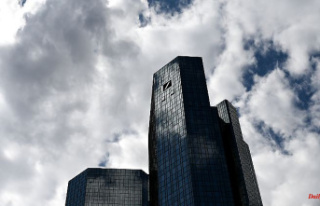The city is evacuated, the troops stay where they are - in Cherson, the Russians run the risk of falling into a Ukrainian pocket. Retreating to the river would make the fight much easier for them, but that's not an option just yet.
The Russian troops are delivering new reports from the Cherson region almost every hour: First, it is said, the Ukrainian army has massed tens of thousands of soldiers, from midday the Russian occupation administration then reports the start of a Ukrainian counter-offensive. All attacks have been fended off so far.
At the same time, the Russians begin to evacuate the city. The population is said to have been informed by SMS of the action, which the Russian side calls an "evacuation". State television shows people being taken by ferries across the nearby Dnipro River to the other bank. In the early afternoon, Russia's dictator Vladimir Putin then announced that martial law will apply in the four annexed Ukrainian regions, including Cherson, from Thursday.
"The Kremlin is beginning to cement its power in the occupied regions, and Russian law is being transferred there," Austrian military expert Markus Reisner told ntv.de. Martial law gives the security organs special powers, including vis-à-vis industry and the population.
Despite many advantages that martial law in force from Thursday will have for Russian troops in the Cherson area, their military situation in southern Ukraine remains precarious. The desired evacuation of the city suggests that there simply are not enough troops available in the area to ward off a Ukrainian attack before entering the city area. "If you want to prevent the city from being destroyed in battle, you would have to keep the front line in front of the city, west of the Dnipro River," says former Colonel Wolfgang Richter, who conducts research for the Science and Politics Foundation.
If the Russian armed forces are unable to do this, they would have to ask themselves whether the occupied city can be held at all. Because if the Russians decide to defend Cherson, they run the risk of being encircled there by Ukrainian forces. Such a development "would be very costly for both sides, including the Ukrainians".
A less risky option for the Russian military would be to straighten out the front by withdrawing troops to the Dnipro River and then to the opposite bank. "The river would be the best line of defense," Richter said. Because the Ukrainians have largely made the bridges over the Dnipro impassable with their attacks. Now there are only very few places where you can get to the other bank via pontoon bridges. "Russia could concentrate fire on these," says the retired colonel. "Such a front straightening is a good option if you have little strength." Politically, however, it would be a catastrophe for the Kremlin if Cherson could not be held militarily. "A short time after the annexation of the region, Russia is then faced with the loss of the capital," said Richter.
And the loss of Cherson would also be fatal for the Russians, says Reisner. Because the Russian position there could be a bridgehead from which they could launch new attacks in the spring and try to create a land bridge between the east and the south down to the Crimea. "The Russians could try to make Ukraine a landlocked country," explains the expert. They would have to take Cherson for this plan.
But no withdrawal movements, mostly disguised as "regrouping" by the Russians, have been reported. And martial law will take effect from Thursday. With the help of military censorship, for example, the local occupiers could intervene in all areas of public and private life. They may search houses and apartments or vehicles, check documents and impose curfews, confiscate possessions. The lists could go on.
Facilities that are necessary for the survival of the local population could be relocated to the hinterland, "theoretically to Russia," says Markus Reisner. In his view, such moves could also be an attempt to deprive Ukraine of its industry in order to use it itself. "Essentially, there is a state of emergency," Reisner summarizes martial law.
Another component can pose a particular threat to the resilience and cohesion of the Ukrainian population: the imposition of martial law "can also mean mobilizing in the annexed areas," says ex-military judge Richter. "The Russian armed forces can therefore call up Ukrainians who the Kremlin has declared to be Russians by annexation."
It is also possible to oblige them to other services, such as maintaining public order, transport, energy supply - always in the interest of the occupying power. From the former colonel's point of view, the obligation to perform military or civilian services for the residents of the region would be particularly sensitive, because parts of the population in the areas in the south are actually Russia-affine, have always been. And they have been willing to cooperate with the occupying forces in the past. The conflicts that arise from this within the population would probably intensify under martial law.












